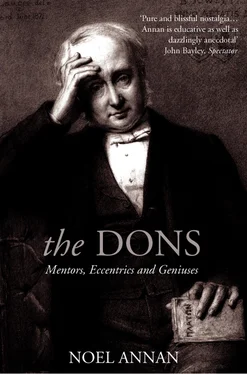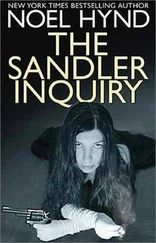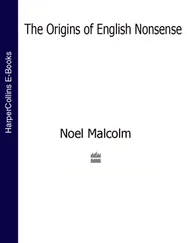Jowett taught his men the secret and the delight of hard work. ‘The object of reading for the Schools,’ he said, ‘is not primarily to obtain a first class, but to elevate and strengthen the character for life.’ ‘You are a fool,’ he said to one. ‘You must be sick of idling. It is too late for you to do much. But the class [in examination] matters nothing. What does matter is the sense of power which comes from steady working.’ By power, Jowett meant the power over oneself, the ‘power in a man to control and direct his own life instead of drifting on the currents of fortune and self-indulgence’.
He used this power over himself. He was small, shy, and in his youth looked like a cherub; but he turned his shyness into an educative weapon by maintaining devastating silences followed by still more devastating remarks. After walking for three hours in silence his undergraduate companion, as they passed by a bridge, ventured to say, ‘That is a fine view.’ The silence continued until Jowett said, ‘That was a very foolish remark you made an hour ago.’ When a man showed up with an indifferent copy of Greek iambics, Jowett asked him, ‘Have you any taste for mathematics?’ He would dictate a passage from English literature and expect, poker in hand in front of his fire, his pupils to extemporise viva voce into Latin or Greek. To be able to do so ‘gave more promise than knowing the whole of Tennyson and Wordsworth’. At all times of day and night his door was open – but for study, not talk. He was not popular as a tutor. He once rebuked a fellow for being too familiar with the undergraduates. He hated slang and insisted on giving a little girl a shilling every time she said ‘awfully’ until she was ashamed. Newman had been the first to regard his duties as a tutor to be pastoral. But, as his one-time disciple and later Rector of Lincoln Mark Pattison said, Newman would have turned Oriel into a priestly seminary whereas Jowett never imposed his own beliefs on anyone.
There are few occasions more likely to produce bad blood in a college than the death or retirement of the head and the election of a successor. At Lincoln Mark Pattison had been an outstanding tutor; but outstanding tutors all too often fail to be elected head of the college – they have offended too many colleagues. Pattison was harsh, severe and sardonic; always willing to wound and never afraid to strike. Yet it looked as if he would be Rector until, by a discreditable intrigue, a non-resident fellow was brought in to vote and Pattison was outvoted. To his fury he had to connive in the election of a boorish nonentity. He threw up his tutorship and left for Germany.
At Balliol in 1854 it was different. The younger fellows voted for Jowett, the elderly for the future Archbishop Temple. The votes were equal. Then Temple’s supporters suborned two of Jowett’s party; would not Robert Scott make a suitable Master? He was part author of the standard Greek lexicon ‘Liddell and Scott’. After all, he was known to be on friendly terms with Jowett. So the deal was struck. Jowett was mortified. He did not leave for Germany, nor did he resign his tutorship. But he sulked. He no longer appeared in common room and when a dinner was given to celebrate the consecration of the new chapel, Jowett sat with the undergraduates. Some consider he was rejected on grounds of unorthodoxy. More likely he was thought to be inflexible. He bided his time and after eleven years elections to the fellowship gave him a majority and Scott was reduced to a cipher.
Jowett lived at a cataclysmic time in the history of the Church of England. The intense inter-party disputes between Tractarians, Evangelicals and the old High and Dry and Low and Slow parties in the Church were as nothing to the more menacing developments in Germany. Scholars there began to apply to the Bible methods of criticising sources that were used in historical research. Clever dons were not perturbed that William Buckland and the geologists had disproved the literal truth of Genesis; but what of the thousands who went to church each Sunday and believed every tale in the Bible to be true? Clever dons, however, were appalled when they appreciated what the ‘higher criticism’, as it was called, was doing in Germany, where professors in the classroom mocked the miraculous doings in the Old Testament; and thus anyone suspected of being influenced by German scholarship was assumed to be unorthodox. The years of Jowett’s maturity were years marked by a series of rows, disputes, accusations of treachery and reproaches for bigotry. It was the age of the row over The Origin of Species and of the colonial bishop, John Colenso, who admitted that the questions of the simple natives to whom he ministered had shown him that the literal truth of the Bible was unsustainable. They were years when those who, however tentatively, tried to reinterpret Scripture were bound to be attacked by, for example, Henry Liddon, who became the leader of the Tractarian party. Liddon declared that if Jesus believed Moses to be the author of the first five books of the Bible, anyone who doubted this – or that Jonah lived in the belly of the whale – called Christ a liar and could not be a Christian.
Before he failed to be elected Master of Balliol Jowett had been among those reinterpreting Scripture. He and his friend Arthur Stanley published commentaries on several of St Paul’s Epistles. The leading biblical scholar of the day, Lightfoot, at Cambridge, dismissed Stanley’s work as readable, inaccurate and superficial. He thought better of Jowett. Jowett was more skilful, said Lightfoot, at destroying accepted interpretations than at forming a new one, but he praised Jowett for challenging received opinions. Jowett had set himself to reinterpret the doctrine of the Atonement. Sunday after Sunday in Evangelical and Low Church pulpits the congregation was told why Christ died for all mankind on the Cross. He died to atone for their sins. But there was a proviso. He made this bargain with God the Father provided that the sinner ‘closed with the offer’ – who must proclaim his faith that he was saved. Jowett found this offensive. Was the redemption of mankind to be compared to a huge commercial transaction? Jowett determined to sanitise this version of the central Christian dogma. He had visited Germany and consulted the renowned biblical critic Lachmann. That was enough for the traditionalists. Having humiliated Newman over the Martyrs Memorial, ‘Golly’ Go lightly now determined to humiliate Jowett.
The year after Jowett’s defeat for the mastership Dean Gaisford died and Palmerston appointed Jowett to the Regius professorship of Greek. Golightly dug up an old statute and forced Jowett to sign the Thirty-Nine Articles in front of the Vice-Chancellor. Jowett did so with contempt. He interrupted the Vice-Chancellor, who began a sententious speech to remind him what an awesome occasion this was, and stalked from the room. He met with further injustice, this time at the hands of the Tractarians. The Regius chair was worth only £40 a year and Jowett lost money by accepting it. The stipend was paid by Christ Church. Why should Christ Church, asked Pusey as a canon of Christ Church, finance a university professorship held by a man whose orthodoxy was suspect? Such was the legacy of Tractarian zeal.
To do Pusey justice he tried various devices to increase Jowett’s salary but every attempt was foiled by Jowett’s foes – and sometimes by his friends. It became more difficult when in 1860 Essays and Reviews was published. This was a book of contributions by churchmen, some of whom were trying to come to grips with the critical analysis of the Bible by German theologians. They were a distinguished lot: Temple and Pattison among them, but also four, including Jowett, who had become notorious for their unorthodox views. The book created yet another scandal. Two of the contributors were prosecuted and found guilty in the ecclesiastical courts. One of them was condemned for doubting whether the wicked would suffer Eternal Punishment in hell. In the end the Judicial Committee of the Privy Council acquitted. But the judgement had a more serious consequence. It meant that the State, not the Church, would decide whether individual clergymen were unorthodox. The rows continued to the end of the century. Good, earnest dons brought up to see themselves as defenders of the faith believed that it was their duty to protest at deviations from what had until yesterday been regarded as true; and equally good but enquiring dons believed it was their duty to show how it was possible to reconcile Christian belief with the most recent discoveries of scientists and of historical and textual research. The Privy Council’s judgement stopped dozens of priests from being ejected from their livings and the Church from being torn apart by faction.
Читать дальше












